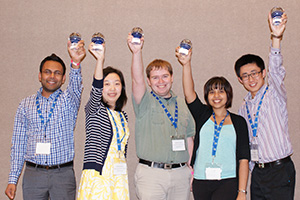UOIT students share in RBC award for innovation
July 11, 2013

TORONTO, ONTARIO – University of Ontario Institute of Technology (UOIT) students Matthew Clark and Alvin Lee are in the national spotlight for being part of the winning team in the first-ever 24-hour RBC Next Great Innovator (NGI) Challenge Prototyping Event. Clark and Lee (who will be entering the fourth year of their Bachelor of Science in Computer Science programs at UOIT in the fall) were two of the five team members awarded $5,000 by a panel of RBC executives for creating a working prototype, including social media components, that would make everyday banking easier.
"It's been a really eye-opening experience for us to work with the students – we’ve been able to explore many creative and fresh ideas and concepts," said Avi Pollock, Vice-President, Innovation and Strategic Planning, RBC and a judge of this year's competition. "We pride ourselves on being leaders in innovation at RBC, always finding new and better ways to do things. Becoming the first bank in North America to hold a 24-hour prototyping event seemed like a natural evolution of the NGI program."
The official challenge question asked participants to use the shared development platform, Heroku.com, to build an innovative prototype for a mobile, tablet, web or desktop app that utilizes the power of social to seamlessly integrate banking into the daily lives of our clients.
The team with Clark and Lee was selected from 54 teams and 153 post-secondary students and recent graduates, representing 22 schools across Canada. Their prototype and idea focused on transferring money and sharing product and educational information between mobile devices by tapping them together.
"The experience of taking part in the first ever NGI Prototyping Event has been amazing. We walked away with a great prize, successfully solved a real-life business challenge under intense pressure and also got to present to senior executives," said Clark. "The challenge put us to the test and we learned so much along the way. We're so proud of what we achieved in the last 24 hours and that we were named the winners of the challenge."
Participants had a week to prepare and 24 hours, from June 21 to 22, to bring the prototype to life, including presentations to a judging panel. The top five finalist teams underwent a second round of judging by a panel of RBC executives. An RBC recruitment booth was open to all challenge participants during the event.
“The UOIT Faculty of Science is extremely proud of Matthew and Alvin for receiving this distinction,” said Dr. Doug Holdway, Dean, Faculty of Science. “Our market-driven programs in Computer Science are designed to prepare students not only for successful careers, but to also be entrepreneurial, innovative and adaptable to respond to emerging trends. The RBC’s Next Great Innovator Challenge provided a wonderful opportunity for these students to apply their knowledge and find solutions to a significant business challenge.”
Clark and Lee are students in the Computer Science Co-operative Education program at UOIT, which has developed a significant relationship with RBC Financial over the past three years. Six other UOIT Faculty of Science Co-op students have obtained relevant and career experience with RBC over that time, all achieving exceptional employer evaluations.
For the past seven years, the RBC Next Great Innovator Challenge has taken the form of a nation-wide competition that asked college and university students to answer a real-world business challenge by providing an innovative idea. This year, the initiative took on a new approach to include four separate challenges taking place at various times throughout the year, including the new 24-hour prototyping event. Since its start in 2006, over 2,300 students have participated in the RBC Next Great Innovator Challenge.
Over the years, numerous ideas put forward by NGI participants have been tested and streamlined in the RBC Innovation Experience Lab and some have been developed for use at RBC. The telepresence technology in RBC retail stores was produced based on the past winning submission, the VIBE interactive personal banking workstation. Prototype submissions from this year will follow the same process.



